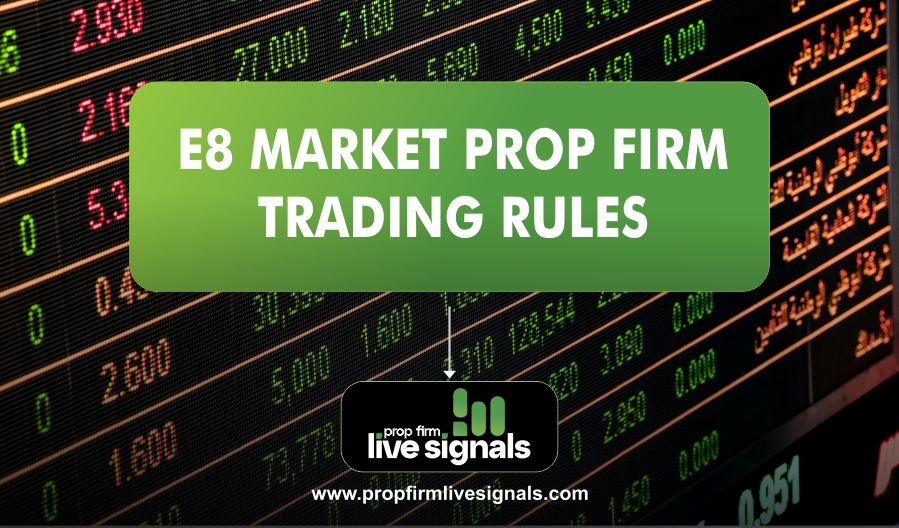E8 Markets provides traders with a funded account, allowing them to trade forex, commodities, stocks, and indices, among other assets. However, to maintain fairness and ensure sustainable profitability, E8 Markets enforces a set of proprietary trading rules that traders must adhere to. These rules are designed to protect both the firm and traders by maintaining transparency, preventing market manipulation, and fostering responsible trading behavior.
Understanding Proprietary Trading
It is essential to understand the concept of proprietary trading. Unlike retail traders who trade with their own money, proprietary traders use a firm’s capital to execute trades. In return, they receive a share of the profits generated.
Prop trading firms like E8 Markets evaluate traders’ skills through an assessment process before funding them. Successful traders gain access to larger trading accounts and increased profit-sharing percentages. However, to ensure fair play and mitigate risks, these firms establish strict rules governing trading activities.
Prohibited Trading Strategies
E8 Markets has identified specific trading practices that are not allowed on their platform. Understanding and adhering to these prohibitions is crucial for maintaining an active account.
1. All-or-Nothing Trading
Definition: Placing a trade that risks the entire account balance in a single position.
Reason for Prohibition: This approach is excessively risky and can lead to significant losses, undermining responsible trading practices.
Consequence: Engaging in all-or-nothing trading will result in account termination, though the initial fee paid may be refunded.
2. Hedging Across Multiple Accounts
Definition: Opening opposite positions on the same asset in different accounts, even if both accounts belong to the same trader.
Reason for Prohibition: This practice can manipulate trading outcomes and disrupt the platform’s integrity.
Consequence: Such hedging activities are strictly forbidden and can lead to account closure.
3. Use of Expert Advisors (EAs)
Definition: Utilizing automated software to execute trades on a trader’s behalf.
Policy:
- Permitted Use: Traders can use EAs, provided they are unique to the individual.
- Prohibited Use: If multiple traders employ the same EA, it may lead to account termination.
- Server Limitations: There’s a cap of 2,000 server requests per day, including order modifications.
Reason for Policy: Ensuring that trading strategies remain individualized helps maintain market integrity and prevents coordinated manipulative practices.
Consequence: Violating these EA policies can result in account termination.
4. Irresponsible Trading in Simulated Accounts
Definition: Executing large trades without a clear strategy or ignoring essential market analysis and risk management.
Reason for Prohibition: Such behavior abuses the simulated environment and doesn’t provide meaningful data for evaluation.
Consequence: Engaging in irresponsible trading can lead to penalties and potential account suspension.
5. High-Frequency Trading (HFT) Restrictions
Definition: Executing a large number of trades in a very short time frame.
Policy:
- Trade Duration: No more than 50% of trades can be held for less than one minute.
- Position Limits: Opening more than five positions on a losing trade is prohibited, as it resembles hedging.
Reason for Policy: These measures prevent trading behaviors that could destabilize the market or exploit system inefficiencies.
Consequence: Violating HFT restrictions may result in account review and possible termination.
Evaluation Completion and Account Management
E8 Markets has established guidelines to ensure that traders complete their evaluations independently and manage their accounts responsibly.
Individual Evaluation Completion
Policy: Each trader must complete their evaluation without copying trades from other accounts, whether manually or using EAs.
Reason: This ensures that each trader’s performance is a true reflection of their individual skills and strategies.
Consequence: Copying trades during the evaluation phase can lead to disqualification.
Account Management After Evaluation
Policy:
- Capital Limits: Traders can manage up to $400,000 across E8 Trader accounts upon successful evaluation.
- Copy Trading: Allowed between personal E8 Trader accounts and one E8 Evaluation account, provided the trader can prove ownership of all accounts involved.
Reason: These policies promote responsible scaling and ensure that traders maintain control over their accounts.
Consequence: Failing to adhere to account management policies can result in account restrictions or termination.
Protective Risk Measures
To maintain a fair trading environment, E8 Markets enforces protective measures against prohibited practices.
Penalties for Prohibited Practices
Policy: Engaging in banned trading activities will lead to program termination and a refund of the fee from the affected account.
Reason: This deters traders from engaging in activities that could harm the platform’s integrity or other traders.
Consequence: Traders found violating these rules will face account closure and forfeiture of any profits.
Conclusion
E8 Markets’ proprietary trading rules are designed to maintain a fair and sustainable trading environment. By understanding and adhering to these rules, traders can successfully navigate the evaluation process, trade with a funded account, and maximize their earning potential. The key to success lies in following risk management principles, respecting firm policies, and executing responsible trading strategies. By doing so, traders can benefit from the opportunities offered by E8 Markets while ensuring long-term profitability.
Frequently Asked Questions (FAQs)
What is the minimum capital requirement to start trading with E8 Markets?
E8 Markets does not require traders to deposit their own money. Instead, traders must pass an evaluation to receive a funded account.
Can I use multiple accounts for trading?
Yes, traders can have multiple funded accounts but must comply with hedging and copy-trading rules.
How does E8 Markets handle withdrawals?
Profits can be withdrawn according to the firm’s payout schedule, typically bi-weekly or monthly.
What happens if I break a trading rule?
Violating trading rules may lead to account termination, with or without refunds, depending on the severity of the violation.




